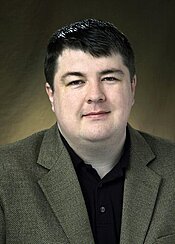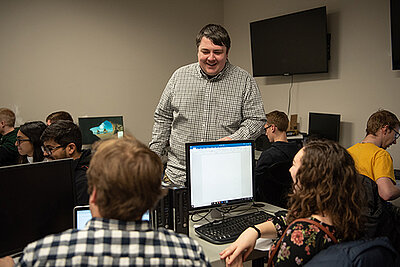NDSU computer expert works to strengthen cybersecurity for U.S.

NDSU assistant professor of computer science Jeremy Straub has received approximately $1.75 million to date in awards from several federal agencies for his work on creating stronger protections for various sensitive systems.
Straub’s list of accomplishments in his six years at NDSU includes serving as director of the NDSU Institute for Cyber Security Education and as a Research and Challey Institute faculty fellow. He is the lead inventor on two U.S. patents and has published over 80 journal articles and hundreds of conference papers. Straub was included in a 2020 list of top-cited scientists worldwide compiled by Stanford University.
Straub’s work in cybersecurity relates to how to autonomously detect and protect computer systems from online attacks. He says protecting these systems is an important topic to look into now because much of the issue comes from design work done years ago. “It’s not so much that these weren’t good decisions back then, but that the environment is changing so rapidly that they aren’t adequately prepared for today’s threats.”
Straub hopes that his research will have broad impact and that the techniques and technologies developed in his research should be able to be applied to numerous other systems. He believes that protecting the water, power grid, financial and other IT systems of our country today is a critical and urgent need given that the threat has become geopolitical.
“We rely on these systems for everything from electricity to heat to clean water and they are subject to attack by anyone anywhere in the world,” he said. “The reasons for an attack could begin with traditional issues like border conflicts in the physical world. Subsequent coordinated cyberattacks on multiple areas of our power grid or defense systems would rapidly bring wartime conditions right to our doorsteps in this country.”

Straub wrote about these scenarios for Scholars Strategy Network in March 2022. In his article, he noted that U.S. Federal agencies should be hearing the wakeup calls provided by current cyberattacks as a sort of Pearl Harbor rallying effort for the nation. “The warning signs for any number of future…attacks might already be present,” he said in the article.
Mark R. Hagerott, Ph.D. North Dakota University System Chancellor says that Straub’s work and the support of federal agencies are important for both the state and the entire country. “Jeremy is helping guard our state and our citizenry by his work in cyber security. The State of North Dakota, the American people, our digital machines, and our networks all will be safer as a result of his work."
Because he believes these kinds of research opportunities are a great opportunity for NDSU students and a good way to recruit more to NDSU, Straub’s research always involves students. As an added benefit, he says he often finds kindred spirits in the young researchers and enjoys training tomorrow’s cyberexperts, future researchers, and instructors
“They’re interested and curious about learning skills that are directly attached to needs of the world. My work offers them a unique opportunity to work on something with national importance at an R1 research institution.”
NDSU vice president of research and creative activity Colleen Fitzgerald said, “NDSU continues to increase the amount of our federally funded cybersecurity research, highlighting the important role North Dakota State University plays in helping the nation be prepared in the face of global threats. Dr. Straub’s work is a great example of the unique value the university brings to the state and beyond.”


